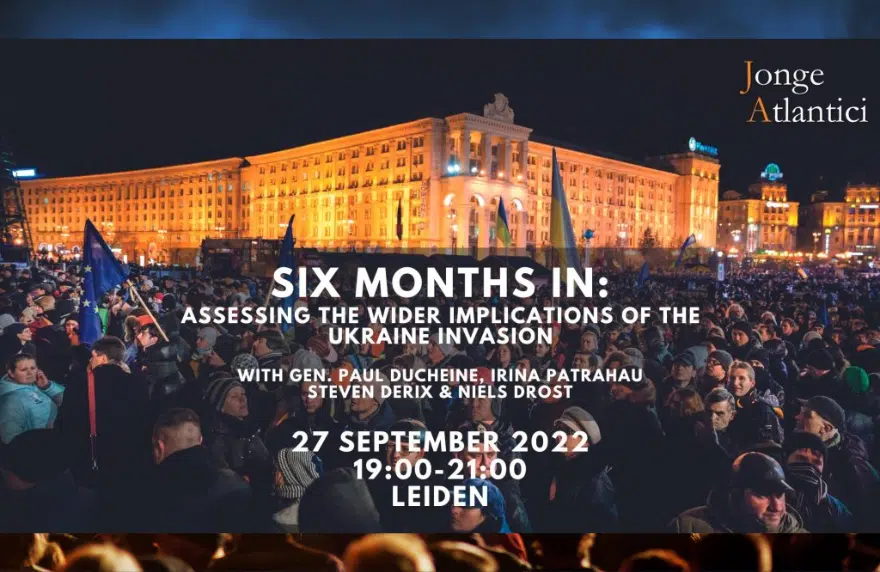On Tuesday 27 September 2022 the Netherlands Atlantic Youth (‘Jonge Atlantici’) invites you to the first event of the season titled: “Six months in: Assessing the wider implications of the Ukraine invasion”
On 24 February 2022 Russia launched a massive invasion of Ukraine. What followed is a war of attrition where resolution seems far removed. Faced with a high level of short-term and long-term uncertainty, it is important to assess the wider impact of the war seven months after its start.
The evening will start with a keynote speech by Gen. Paul Ducheine exploring the conventional and cyber warfare dimension of the Ukraine war. After, we will join in four roundtables that each highlight a different component making up the larger spillover: the military-strategic dimension, the impact on the mutual vulnerability of interconnected energy markets, the use of historical narratives and (dis)information, and the repercussions of Russia’s “special military operation” on its domestic politics and society.
The invasion saw the return of war to the European continent. The confrontation would prove to be the first major conflict involving large-scale targeted cyber operations. At the same time, at the strategic level the focus remains on the conventional forces, with the brunt of the fighting seemingly contained to the east where Russian forces have bombed and shelled Ukrainian cities. The full effects remain unclear thusfar. What has the Ukraine war shown about the expected change in the nature of warfare? What can Ukraine’s defences against Russia’s offensive cyber operations teach others about the preparation needed to seize the advantage in cyberspace?
The impact of the war has been felt beyond the area where the actual fighting occurs. Already, the invasion has demonstrated a significant impact on international resource markets. Especially the markets for energy and natural resources have witnessed supply shocks, with the prices of commodities skyrocketing over recent months. How will the conflict continue to affect European energy security? Moreover, with winter approaching and with it the demand for natural resources expected to rise, what might be expected for the coming months?
The war has also shown the continued significance of historical narratives in geopolitics. In his speeches, Putin has made it clear that he believes Ukraine has no historical claim to independent statehood, using a revisionist interpretation of Ukrainian history in an attempt to legitimize the Russian invasion. Meanwhile, Ukraine has bolstered its own national identity as a country whose rightful place is within the European community. With clever use of public heroes – spearheaded by president Volodymyr Zelensky – Ukraine presents a compelling story of resilience. How has Putin used such historic narratives, and to what success? Who and what is behind the successful Ukrainian media campaign?
At the same time, Russia has been increasingly isolated on the international stage. The united and rapid response to Putin’s war has been unprecedented, causing perhaps as much surprise in European capitals as in Moscow. While the economic and financial sanctions on Russia have so far been unable to coerce Putin to abandon his military pursuits in Ukraine, they have inflicted serious damage on the Russian economy. The Kremlin has also tightened its grip on the public sphere, cracking down on the few independent media left in Russia and restricting access to foreign information sources. Under fear of reprisal, the large anti-war demonstrations that took place at the onset of the war have died down and public dissent has largely gone underground. Lacking trustworthy news coverage, how has everyday life changed for the average Russian citizen? What is known about the growing discontent? Furthermore, what have been the expected repercussions for the Russian political reality, now and in the near future?
These and other questions will be discussed in break-outs this evening. Join us in a roundtable event with our speakers Paul Ducheine, Irina Patrahau, Steven Derix and Niels Drost! Afterwards there is the chance to enjoy a drink.
Speakers:
- Gen. Paul Ducheine is Professor of Cyberwarfare at the Netherlands Defence Academy, and Professor Military Law of Cyber Operations & Cyber Security at the University of Amsterdam. Ducheine specializes in non-kinetic warfare.
- Irina Patrahau (MSc) is a Strategic Analist at the The Hague Center for Strategic Studies (HCSS). Irina’s expertise revolves around the energy markets and the energy security of supply, including Europe’s dependence on Russian natural gas.
- Steven Derix is a journalist for NRC Handelsblad. He has recently published the life story of Zelensky in ‘Zelensky: De oorlogspresident’. Previously, Derix worked as a correspondent in Moscow.
- Niels Drost (MA) is a Junior Researcher at the Clingendael Russia & Eastern Europe Centre (REKA). His research revolves primarily around contemporary politics and security issues in Eastern Europe, the Caucasus and Central Asia.




